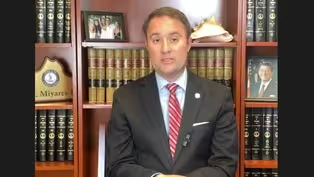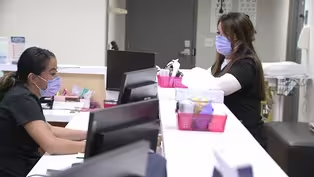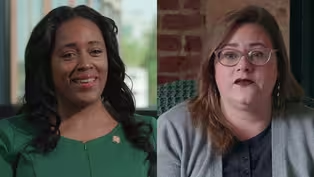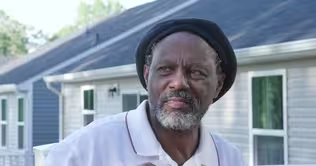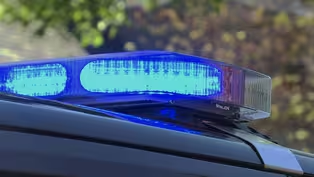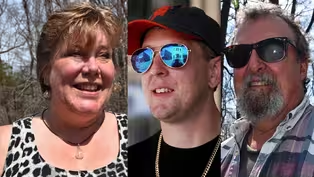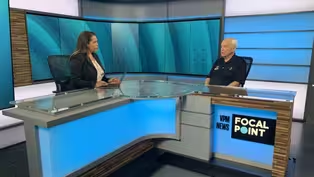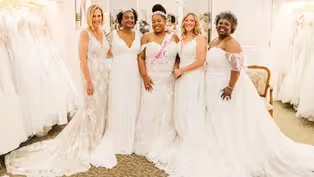VPM News Focal Point
Survivors | April 27, 2023
Season 2 Episode 9 | 26m 46sVideo has Closed Captions
Wrongfully convicted and lost years of life; escaping sexual abuse; women supporting women
Innocent people find a way forward after being wrongfully convicted and losing years of life; A survivor of sex trafficking helps others who have escaped abuse; A group of women connected by cancer find much more than support.
Problems playing video? | Closed Captioning Feedback
Problems playing video? | Closed Captioning Feedback
VPM News Focal Point is a local public television program presented by VPM
The Estate of Mrs. Ann Lee Saunders Brown
VPM News Focal Point
Survivors | April 27, 2023
Season 2 Episode 9 | 26m 46sVideo has Closed Captions
Innocent people find a way forward after being wrongfully convicted and losing years of life; A survivor of sex trafficking helps others who have escaped abuse; A group of women connected by cancer find much more than support.
Problems playing video? | Closed Captioning Feedback
How to Watch VPM News Focal Point
VPM News Focal Point is available to stream on pbs.org and the free PBS App, available on iPhone, Apple TV, Android TV, Android smartphones, Amazon Fire TV, Amazon Fire Tablet, Roku, Samsung Smart TV, and Vizio.
Providing Support for PBS.org
Learn Moreabout PBS online sponsorshipANGIE MILES: Adversity is a normal part of life, but for some of us, hardship and heartache seem to be more plentiful than what others experience.
How do people endure it?
In this episode, we will address topics that may be difficult for some.
We'll consider those who survived mass shootings, sit down with survivors who've lived through decades of wrongful imprisonment, unfathomable human trafficking, the torture of war, or life-threatening encounters with cancer.
Meet survivors on VPM News Focal Point.
Production funding for VPM News Focal Point is provided by The estate of Mrs. Ann Lee Saunders Brown.
And by... ♪ ♪ ANGIE MILES: I'm Angie Miles.
Welcome and thanks for being with us for VPM News Focal Point.
We hear the saying that life is not fair, but when it seems an uncommon amount of unfairness appears in some people's lives, they find the fortitude to persist.
We're going to hear from people with wisdom to share about going over, under, around, or through challenge, trauma, and pain.
And a warning, the next story addresses gun violence.
It has been nearly six months since a man shot and killed six of his colleagues at a Chesapeake Walmart.
The store just reopened in mid-April.
Multimedia journalist Keyris Manzanares spoke with an expert to learn more about the aftermath of this kind of shooting for the survivors and for the broader community.
KEYRIS MANZANARES: Dr. Laura Wilson, an associate professor of psychology at the University of Mary Washington, says that people's reactions after a mass shooting are as unique as they are.
LAURA WILSON: We find that a lot of people are actually surprisingly resilient.
Some people experience very little fluctuation in their functioning.
KEYRIS MANZANARES: But people who are physically injured often have more long-term mental health issues.
LAURA WILSON: It's fairly typical for someone who has been directly impacted to have at a minimum, short-term issues.
That could be difficulty sleeping.
They might have some survivor guilt.
They might also have some anger and some frustration, depending on the nature of the shooting, but then that can also translate into long-term issues like depression and PTSD.
KEYRIS MANZANARES: When it comes to workplace mass shootings like we saw at the Chesapeake Walmart, Dr. Wilson says survivors tend to feel more survivor's guilt.
LAURA WILSON: A survivor might say, "I knew this person and I maybe could've done something.
I maybe could've predicted this was going to occur."
Sometimes, it might lead to more anger, because maybe, they feel like the place of employment could have stopped it.
KEYRIS MANZANARES: The community also feels an impact, because of the news they see about mass shootings on social media.
LAURA WILSON: We see that a lot of individuals are live streaming events.
They're tweeting as things are happening.
They're texting family members.
There's more video footage than ever before of people hiding or fighting back during mass shootings and it's giving people a front row seat to the horror.
ANGIE MILES: The Gun Violence Archive counted 646 mass shootings in the U.S. in 2022.
20 of those were in Virginia.
Dr. Wilson says, anyone experiencing a reaction to any traumatic event should consider speaking with a mental health professional.
ANGIE MILES: It can be difficult for people to know how they might handle a crisis situation unless and until they experience one.
We wanted to know if generally there are traits that can help people be better equipped to handle life's most challenging situations.
We put that question to people of Virginia.
KIMBERLY MARCIANO: I think it's having a good network of support, whether it's family or friends, coworkers, things like that.
People they can go to when they're upset or confused and don't know what to do.
I think it's a network of support.
IRL WEATHERFORD: I think somebody's ability to survive hardships or unfair treatment is based on their character.
If they're strong of character and can stand up for their beliefs, no matter what anybody says to 'em, you know, they ought to be able to manage that situation.
LEE JACOBSON: I personally think that therapy is a super valuable tool that everybody should use.
You know, every therapist has a therapist, so I definitely think talking about your issues and, you know, not running away from them would be helpful.
ANGIE MILES: More than two million Americans are in prison and some estimates suggest that at any given time, there are about 100,000 who are innocent of the crimes for which they were convicted.
In the past 30 years, more than 3,000 people have been exonerated after spending years behind bars.
One such person is Joseph Carter.
He survived almost three decades in prison for something he did not do.
JOSEPH CARTER: I couldn't believe it.
I really couldn't believe it, and in my heart, I just went to my knees.
ANGIE MILES: Joseph Carter describes the moment he heard the guilty verdict echo through a courtroom for a crime he knew he had not committed.
His ordeal began in November of 1989 in the picturesque Ocean View area of Norfolk, Virginia.
There was a vicious stabbing of two men in one of the motels near the water.
Carter had lived for a time in the efficiency next door, along with his young family.
Within a few days, Carter was sitting in the Norfolk jail, charged with murder.
That's despite conflicting witness accounts, no physical evidence linking him to the crime, and some crime scene evidence that was ignored.
JOSEPH CARTER: I was convicted on my mother's birthday, and my mom, it was just, it was too much for her.
ANGIE MILES: At the age of 31, the Navy veteran, husband and father of three with one child on the way says he was innocent but watching his future disappear, unable to stop it.
JOSEPH CARTER: Two life sentences and 35 years.
ANGIE MILES: But even as he braced for prison, he says he knew he could never give up trying to get out, trying to get his life back, trying to prove his innocence.
During Carter's incarceration, his losses multiplied.
Absent from his family, they struggled financially and emotionally.
He lost a brother and a son to gun violence.
He endured a divorce, and his mother did not live to see him make it home.
JOSEPH CARTER: And see, I know my mother died of a broke... (sobbing) a broken heart.
ANGIE MILES: Carter says, all the love, the discipline, and high expectations his parents had poured into him since childhood saw him through some of his darkest days.
JOSEPH CARTER: You have to be relentless.
You can't even think one second that you belong here.
"Boy, you better get them grades right," my mom.
“You better... ” I hear my dad.
I can hear him.
That's what pushed me.
‘I'm not dying in here.
I'm not dying in here.
So, you had to conjure up everything in you to survive it.
ANGIE MILES: He was also encouraged by other prisoners who helped him navigate the system.
He became an expert on the law and prolific at helping others with their cases.
JOSEPH CARTER: I defended some of the guys.
Theyd go for disciplinary actions, things of that nature, because I learned the law, an inmate advisor.
So, that's what I end up being.
ANGIE MILES: Carter says surviving prison meant being careful to stay out of trouble and not crossing anyone.
He says the greatest lessons included always being willing to help someone else, which he says always seemed to help him, as well.
JOSEPH CARTER: I had to because I want to get out, too, so if I help him, I can get help.
ANGIE MILES: After almost three decades behind bars, this relentless, innocent man found the Innocence Project at the University of Virginia.
They took his case and helped him to win parole.
One of the eyewitnesses later recanted her testimony, effectively admitting that she had been pressured to identify her old neighbor as the guilty one.
At the same time, the lead detective from the motel homicide was tried and convicted for corruption, including witness coercion in other cases, as well, and he served 12 years in prison.
After 27 years, after Greensville, Sussex 1, Sussex 2, Nottoway, and Buckingham, Joseph Carter walked out into the light and caught a bus for home.
In 2021, he got the news he'd been waiting to hear for 30 years Affirmation of his innocence took the form of a full pardon from Governor Ralph Northam.
JOSEPH CARTER: When I got my pardon, it was nothing like when I walked out of prison.
My wife was out the room.
I was lying in bed, and I was like, 'Baby, baby.'
Big tears like... (hands hitting) Oh, God.
It was like being reborn.
ANGIE MILES: Now with his new wife, Phyllis, by his side, he's starting to rebuild his life.
With a disability that he attributes directly to his imprisonment, he fights to manage his anger, and he says the justice system is in desperate need of change.
JOSEPH CARTER: Those public officials who are entrenched in the legal system, they need to be checked, and you can't have absolute immunity when you lied on the stand or you knew he was lying on the stand or you solicited a lie.
You put me in prison.
You took my life.
ANGIE MILES: Virginia awarded Carter $1.5 million in restitution.
He says it doesn't begin to address his losses.
The spinal stenosis he suffers, he says, is the result of walking on concrete prison floors sleeping in prison beds and holding manual labor jobs, the only jobs he could get before he was exonerated.
ANGIE MILES: VPM News Focal Point is interested in the points of view of Virginians.
To hear more from your Virginia neighbors, and to share your own thoughts and story ideas, find us online at vpm.org/focalpoint.
ANGIE MILES: The U.S. State Department considers human trafficking a form of modern slavery.
It happens when a person is forced to work or perform sex acts under threat of violence and often through coercion and fraud.
Worldwide, over 27 million people are trafficked every day and 90% of female victims are sexually exploited.
In Virginia, the Richmond FBI reports an increase in cases this year.
Last summer, Governor Glenn Youngkin established the Commission on Human Trafficking Prevention and Survivor Support to bring law enforcement, trauma experts and survivors together to combat this crime.
Senior producer Roberta Oster spoke with people on the front lines of this battle.
PAMELA LYNN HOCK: No matter how large or how small this city is, we need to focus on the idea that sex trafficking, victimization of humans knows no poverty line.
It knows no bounds in terms of status.
It doesn't care.
You know, we live in this cute little state of Virginia, and people ask how it compares, you know?
"Well, it's not as bad as New York.
It's not as bad as San Diego."
It's bad enough for me, and one case of sex trafficking should be enough for people to care.
PAMELA LYNN HOCK: You see, I'm a survivor of sex trafficking from the age of 13 to almost my 18th birthday.
PAMELA LYNN HOCK: I had this one friend that I would spend a lot of time with, and unfortunately this friend came from a very abusive household and they had a much older brother who was involved in drugs and gun violence.
And the day came where we were victimized by her brother and his friends.
They began to continually abuse us and then give us to, when I say give us, it's under threat and coercion, like, "You need to go with this friend or this person and do these things for them because we're telling you to."
PAMELA LYNN HOCK: I was taken from my home and my family, and I was forced to do things that no one should ever have to do.
PAMELA LYNN HOCK: One of the questions that I get is, "Why didn't you leave?"
We were children, and we did not have the developmental processes to let alone process the trauma that happened to us and then have the wherewithal to feel like we would be safe enough to tell someone.
And so we believed everything that they told us.
When they said, "We are going to murder you if you don't do what we tell you to do," we believed them.
ZANE GRAY: I think one, they're afraid because most of the time, they work under a master and they pretty much have them in their control.
So they're very, very fearful of what the repercussions to them could be.
PAMELA LYNN HOCK: So there was a girl that I once knew, and her name was Allison.
The last time I saw Allison, we were locked in a closet together in a hotel room outside Charlottesville.
I remember the closet door opened and one of our traffickers grabbed her arm and she wouldn't let go of me and she was just screaming, and they ripped her off of me.
And the closet door closed and I heard a few thuds and then I heard a gunshot.
And that was the last time that I ever saw Allison.
See, if you didn't comply with the rules, then you were not worth anything to them to keep you alive.
And so they just decided that your life was worth taking.
I think that the average American believes that trafficking victims/survivors are people who are standing on the corner.
JUSTIN COWAN: Unfortunately, the crime of human trafficking can happen anywhere.
It can happen in the homes that are in the very corner of Western Virginia.
It can happen in the Richmond metro area, Hampton Roads, Northern Virginia.
With the nature of communication today and the internet being what it is, this can really happen anywhere.
There's no one agency that is uniquely equipped to tackle the human trafficking issue alone, so we come together, we play to each other's strengths and fill the gap on weaknesses in order to best serve the victims of this crime.
PAMELA LYNN HOCK: I got my first degree in EMS, in paramedic studies, and then I got a criminal justice degree.
Then I went to school for a psychology and I got my bachelor's degree, and then I got my master's degree in forensic psychology.
A part of my advocacy and educational work is going to universities to speak about trafficking.
And I get calls all the time from universities to go talk to those students.
And my most recent project was to be on the Human Trafficking Prevention and Survivor Support Commission for the State of Virginia.
The purpose of the commission was to come together and address three main points: education, survivor support, and law enforcement side of how can we come together and support survivors, create laws, and educate the community about trafficking.
I was excited about the opportunity to have my voice as a survivor and, you know, the other survivors who were with us.
TANYA GOULD: I actually went to Chesterfield County Jail and did a talk with another survivor.
My name is Tanya Gould, and I'm director of Anti-Human Trafficking for the Office of the Attorney General.
Now, one girl, she did have a prostitution charge.
So the commission had survivors that were also a part of the commission in order to really give us good insight as to what survivors need.
And that's how you walk away with real, tangible, long lasting, beneficial reach into vulnerable populations, specifically.
When you think about it, survivors, you know, being a survivor myself, you know, we understand the thought that society sees us as criminals.
And so to be able to bring that mindset to the table to say, "Well, we're not criminals, we're actually victims," and the process from understanding what it means to go from victim to survivorship, that's important for people who are leaders in a movement, who are creating legislation, and who are doing programs, it's important for them them to understand that journey and that process.
They just know that what they did was wrong because they did it.
I didn't have love and support and validation growing up as a child.
It was all about surviving and trying to figure things out and, you know, doing a lot of things on my own.
So when someone comes into your life and realizes you didn't get those things, that's where they can, you know, play on you to do things their way.
Three of them disclosed that they were trafficked as teenagers.
I remember one time when I was with my trafficker and we were recruiting, and I saw a really pretty girl.
And, you know, I'm like, 'Oh my goodness, she's so beautiful.
What about her?'
And he says, "Uh, no, that wouldn't work.
Look how confidently she's walking.
Look at her, walking with her head up and her back straight."
And at the time I didn't get it, but I understand now the beauty that I saw was confidence.
And it was worth, and it was value.
She knew who she was.
I didn't know who I was, right?
And so that's what my trafficker took advantage of.
Knowing my worth and my value and, you know, all of those things, that is a deterrence when we're talking about prevention, human trafficking prevention.
PAMELA LYNN HOCK: I'm going to do what I have to do to survive and to continue to tell my story.
The public has a responsibility to know and understand what they're seeing around them, what is happening within their community, so that they can support survivors, they can support victims, they can take action.
They can also know when legislation is being passed and bills come up, what they need to support.
So education is important so that we can change society's mind about what trafficking looks like to them.
ANGIE MILES: While anyone can become a victim of human trafficking, those who are especially vulnerable include runaways, unhoused youth, those with mental health and substance abuse concerns, and victims of domestic violence or sexual abuse.
People of color are disproportionately victimized by sex trafficking.
Law enforcement experts recommend if you see something, say something.
Dial #77 to report suspected trafficking to Virginia State Police.
For additional resources and information on the anonymous tip line and to watch an interview with Attorney General Jason Miyares on this subject, visit our website at vpm.org/focalpoint.
ANGIE MILES: It was fifty years ago in February 1973 when six hundred prisoners of war were released from captivity across Vietnam.
Many of these P.O.W.s had been held for years.
Paul Galanti is among them.
He survived two thousand, four hundred, thirty two days in what has become known as the Hanoi Hilton.
He joins us now to talk about his ordeal.
Tell us about the conditions at Ha L ò also known as the Hanoi Hilton.
PAUL GALANTI: Well, Ha L ò was actually pretty good.
It was dry.
They had a roof over our heads.
and I had a nice concrete bed to sleep on and in case I was going to roll off it, I had nice little leg irons that would clamp my ankles, had to keep it from rolling off.
I got two meals a day of totaling about 900 calories.
A little bowl of either greens or pumpkin soup which is pumpkin meat and water, and then usually some rice, and so, you know, but I made it.
ANGIE MILES: In your life since then, what has all of that taught you about survival that you can impart to other people?
PAUL GALANTI: I always summarize with the three things I learned.
And the first one, I wasn't as tough as I thought I was and the second was no matter how bad I had it, somebody else always had it worse.
My last thing is there's no such thing as a bad day when you have a doorknob on the inside of the door.
ANGIE MILES: You can watch the full interview on our website.
ANGIE MILES: Friends brought together by a cancer diagnosis.
They call themselves The Girlz, and as a group, they've done so much more than survive sickness.
News producer Adrienne McGibbon shares their story.
VANESSA SPURLOCK: We met because of cancer but we don't circle our whole life around what that is.
For the five years that I've known them, I can't imagine now not having them in my life because they're totally a part of family now.
KISHA MORGAN: When you're with those friends, you forget about your diagnosis that you had because you'll have friends that may help you through those times.
VANESSA SPURLOCK: Each year we try to do something just to celebrate us.
It could be we go to a movie, we go out to dinner, maybe a girl's day.
I was sitting at work and I was like, 'Gosh, what can we do this year that's different than something we've never done?'
So I called... BECKI WINES: Tiffanys Bridal.
VANESSA SPURLOCK: And I started off with, 'Hi, my name is Vanessa and I have a crazy question for you.'
BECKI WINES: She wanted to know if we could let her borrow some dresses.
She explained a little bit about what she wanted to do, that they just wanted to celebrate.
They were cancer survivors and just wanted to kind of glam up and dress up and just celebrate life.
VANESSA SPURLOCK: So it turned into looking for a dress to doing a photo shoot for Tiffanys.
BECKI WINES: We had probably about five or six dresses for each lady.
so when they came in, they could try those on and they could find that one that made them feel beautiful.
PAIGE HEATH: I loved every minute of being brought into this group.
I jumped at the chance being a breast cancer survivor myself, just to be able to share in their joy and elation and just share the happiness.
VANESSA SPURLOCK: It was like we were 16-year-old girls just in somebody's closet and you get to pick whatever dress you wanted to put on.
KISHA MORGAN: I felt absolutely amazing and beautiful and there's so many different types of dresses that you can get, you know, and to shape your figure.
My figure is different.
VANESSA SPURLOCK: With a breast cancer diagnosis, your mental change, your emotional change, your physical change, and we get to see that every day.
But when we came in here, it didn't matter if we thought our bodies may have had whatever imperfection, whatever scar, whatever flaw, all of it was just absolutely beautiful.
BECKI WINES: Vanessa had mentioned, our bodies don't look the same but we're still the same people, and I just wanted to give them a time where they could feel like that person that they felt like they are in the inside.
Maybe their bodies changed, maybe they look different.
When they look in the mirror, they don't see the body that they saw a few years ago but they're still the same person.
SHANNON BEASLEY: It was kind of a healing process, really, being here and and feeling beautiful and seeing the dresses and being with other women and seeing how they looked just as beautiful is very empowering.
VANESSA SPURLOCK: Survivor means to me that, yes, there is no longer a tumor that exists, but that I've survived more than just a tumor.
I think that being a survivor gives you a whole new life.
We have so many young people now that are like, you know, they're like living to die.
As a survivor, no, we are dying to live.
ANGIE MILES: Whether finding support or becoming a support when calamities arise, we can each have a role to play in surviving life's most pressing predicaments.
We hope you'll venture to our website to hear the full interview with Paul Galanti whose survival as a prisoner of war is educational and empowering.
You can also see our exclusive interview with Virginia Attorney General Jason Miyares as he addresses human trafficking.
vpm.org/focalpoint is a place for your feedback and story ideas.
We'll see you next time.
Production funding for VPM News Focal Point is provided by The estate of Mrs. Ann Lee Saunders Brown.
And by... ♪ ♪
Attorney General Jason Miyares is fighting human trafficking
Video has Closed Captions
Clip: S2 Ep9 | 11m 19s | Attorney General Jason Miyares discusses efforts to end the crime of human trafficking (11m 19s)
From unaccompanied minor to physician assistant
Video has Closed Captions
Clip: S2 Ep9 | 2m 59s | This woman uses her Spanish-speaking skills to empower her patients (2m 59s)
Human Trafficking survivors fight back
Video has Closed Captions
Clip: S2 Ep9 | 7m 58s | Two courageous survivors share their stories of being trafficked for sex as teenagers. (7m 58s)
Joseph Carter knows the price of a wrongful conviction
Video has Closed Captions
Clip: S2 Ep9 | 5m 7s | After almost three decades in prison, the Navy veteran is now piecing together his life. (5m 7s)
Psychological aftermath of mass shootings
Video has Closed Captions
Clip: S2 Ep9 | 1m 41s | How do survivors deal with the psychological aftermath of mass shootings? (1m 41s)
Survivors | People of Virginia
Video has Closed Captions
Clip: S2 Ep9 | 57s | How can people be better equipped to handle life’s most challenging situations? (57s)
Vietnam POW shares the lessons he learned from captivity
Video has Closed Captions
Clip: S2 Ep9 | 9m 45s | A Vietnam POW survived over 6 years in captivity. He shares the lessons he learned. (9m 45s)
Women find connection through cancer
Video has Closed Captions
Clip: S2 Ep9 | 3m 15s | Bonded by a cancer, these women found much more than friendship. (3m 15s)
Providing Support for PBS.org
Learn Moreabout PBS online sponsorship
- News and Public Affairs

Top journalists deliver compelling original analysis of the hour's headlines.

- News and Public Affairs

FRONTLINE is investigative journalism that questions, explains and changes our world.












Support for PBS provided by:
VPM News Focal Point is a local public television program presented by VPM
The Estate of Mrs. Ann Lee Saunders Brown
